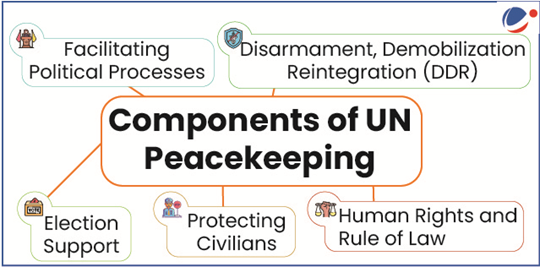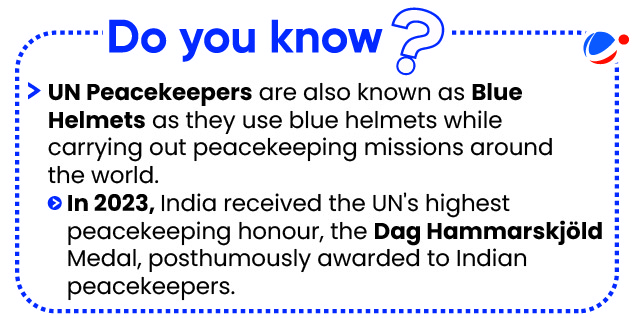Why in the News?
United Nations Peacekeeping Ministerial 2025 concluded recently in Berlin, Germany.
About UN Peacekeeping Ministerial 2025

- It was co-organised and hosted by Germany.
- It serves as a high-level political forum to discuss the future of peacekeeping.
- The meeting coincided with the 10-year anniversary of the 2015 New York Summit on Peacekeeping.
- At the ministerial, India pledged one Quick Reaction Force (QRF) Company, one women-led Police Unit, a SWAT Police Unit and peacekeeping training, capacity building and partnerships.
About United Nations Peacekeeping

- Origin: Began in 1948 with the establishment of the United Nations Truce Supervision Organization (UNTSO) in the Middle East to monitor ceasefires.
- Deployment Mechanism: UN Security Council provides mandates to Missions by adopting a resolution.
- Budget and resources are subject to General Assembly approval.
- Key Rules/Principles of engagement include:
- Consent of the involved parties in a conflict
- Impartiality
- Non-use of force except in self-defense or defense of the mandate.
- Governance: Department of Peace Operations (DPO) of UN, formally created in 1992, provides political and executive direction to peacekeeping operations.
- Currently, it operates 11 peacekeeping missions in regions like Western Sahara, Golan, Democratic Republic of Congo etc.
- Award & Honour: Nobel Peace Prize in 1988.
- Doctrines:
- Capstone Doctrine: It sets out the guiding principles and core objectives of UN Peace operations.
- It also provides a basis for the development of training materials for military, police and civilian personnel preparing to serve in the field.
- Responsibility to Protect (R2P) doctrine (2005): It embodies a political commitment to end the worst forms of violence and persecution.
- Capstone Doctrine: It sets out the guiding principles and core objectives of UN Peace operations.
India's Key Contribution to UN Peacekeeping
|
Key challenges faced by Peacekeeping
- Targeting Peacekeepers: E.g., Peacekeepers of UN Interim Force in Lebanon (UNIFIL) were injured during Israel-Lebanon conflict.
- Opposition from host Countries: E.g. Sudan opposed African Union-United Nations Hybrid Operation in Darfur (UNAMID)
- Credibility Issues: E.g. Failure to prevent genocide in Rwanda and Srebrenica in the 1990's.
- Changing Nature of Conflicts: E.g., rise in conflicts Intra-state conflicts, rather than inter-state, changing profile of armed groups using terrorist tactics and unregulated spread of a new generation of weapons.
- Other: Restrictions on Freedom of Movement; Delays in Political Solutions; Lack of well structured; equipped and trained forces; Lack of participation of major troop contributing countries in decision making, etc.
Conclusion
UN Peacekeeping can be made more effective by implementing recommendations of Brahimi Report (2000) and UN High-Level Independent Panel on Peace Operations (HIPPO) (2015) such as need of Security Council and UN system to act earlier in crisis situations to improve mission success, etc. Further, future peacekeeping must adapt to new security, gender, and human rights challenges, address funding and legitimacy issues, and ensure that peacekeepers are well-trained, well-equipped, and accountable to both the UN and the people they serve.








